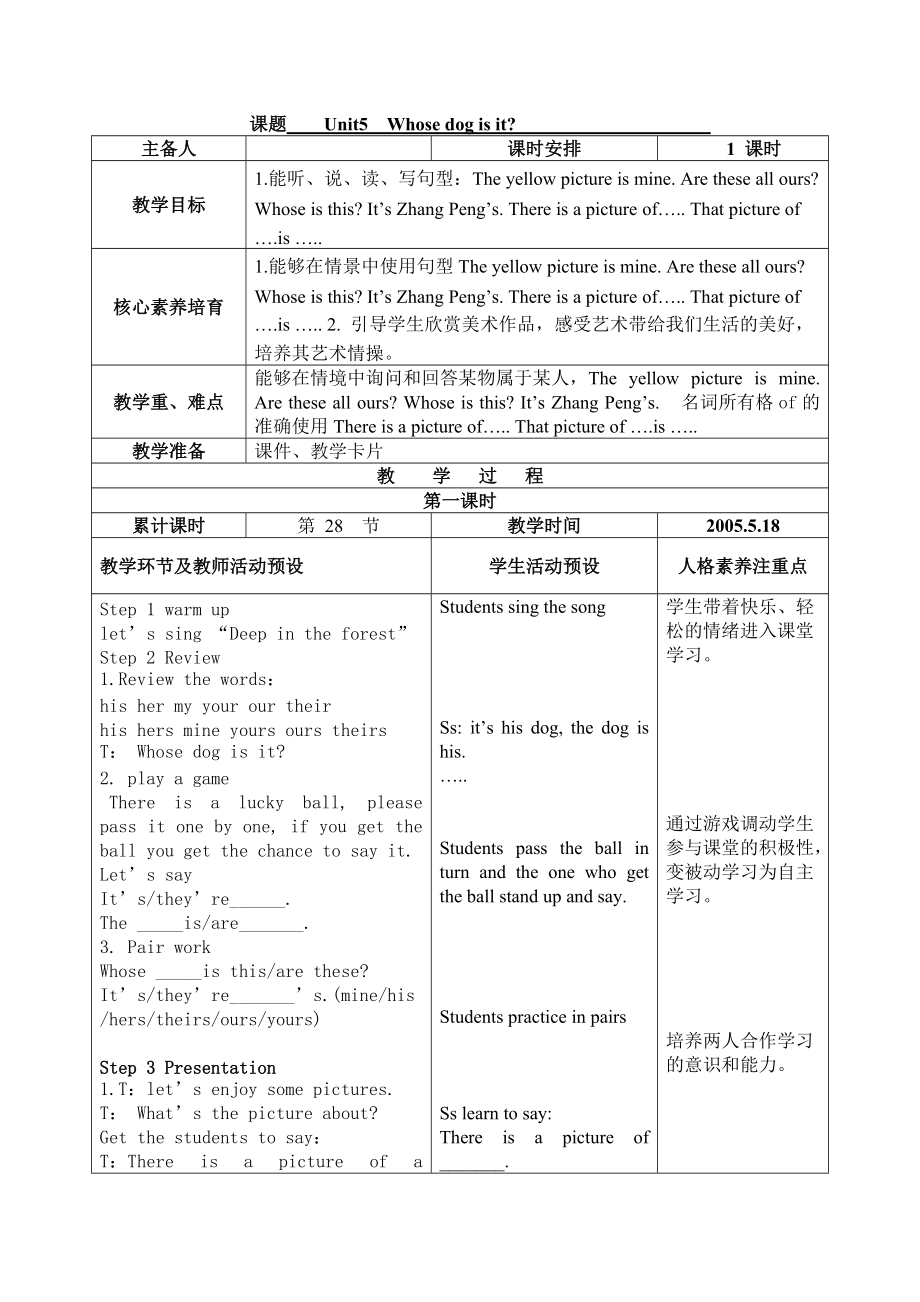《pep五年級(jí)上冊(cè) 課題Unit5 Whose dog is it》由會(huì)員分享���,可在線(xiàn)閱讀,更多相關(guān)《pep五年級(jí)上冊(cè) 課題Unit5 Whose dog is it(3頁(yè)珍藏版)》請(qǐng)?jiān)谘b配圖網(wǎng)上搜索���。
1��、
課題 Unit5 Whose dog is it?
主備人
課時(shí)安排
1 課時(shí)
教學(xué)目標(biāo)
1.能聽(tīng)�����、說(shuō)����、讀、寫(xiě)句型:The yellow picture is mine. Are these all ours? Whose is this? It’s Zhang Peng’s. There is a picture of….. That picture of ….is …..
核心素養(yǎng)培育
1.能夠在情景中使用句型The yellow picture is mine. Are these all ours? Whos
2�、e is this? It’s Zhang Peng’s. There is a picture of….. That picture of ….is ….. 2. 引導(dǎo)學(xué)生欣賞美術(shù)作品,感受藝術(shù)帶給我們生活的美好�,培養(yǎng)其藝術(shù)情操。
教學(xué)重���、難點(diǎn)
能夠在情境中詢(xún)問(wèn)和回答某物屬于某人�����,The yellow picture is mine. Are these all ours? Whose is this? It’s Zhang Peng’s. 名詞所有格of的準(zhǔn)確使用There is a picture of….. That picture of ….is …..
教學(xué)準(zhǔn)備
課件���、教
3�����、學(xué)卡片
教 學(xué) 過(guò) 程
第一課時(shí)
累計(jì)課時(shí)
第 28 節(jié)
教學(xué)時(shí)間
2005.5.18
教學(xué)環(huán)節(jié)及教師活動(dòng)預(yù)設(shè)
學(xué)生活動(dòng)預(yù)設(shè)
人格素養(yǎng)注重點(diǎn)
Step 1 warm up
let’s sing “Deep in the forest”
Step 2 Review
1.Review the words:
his her my your our their
his hers mine yours ours theirs
T: Whose dog is it?
2. play a game
There is a lucky ball, plea
4����、se pass it one by one, if you get the ball you get the chance to say it.
Let’s say
It’s/they’re______.
The _____is/are_______.
3. Pair work
Whose _____is this/are these?
It’s/they’re_______’s.(mine/his/hers/theirs/ours/yours)
Step 3 Presentation
1.T:let’s enjoy some pictures.
T: What’s
5���、the picture about?
Get the students to say:
T:There is a picture of a forest/sea/the sun.
T: How do you think of the picture?
Get the students to say:
That picture of the____ is ______.(beautiful/nice/great)
2.Practise
Work in groups
T: Look, there are more great pictures here.
Can you sa
6、y:
There is a picture of _______.
That picture of _______is _____.
3. T: Are these pictures all ours?
No, they aren’t. They’re some artists’.
T: Are these pictures all ours?
T: They’re Miss White’s students’. They’re at the school art show.
Then help the students understand the words “”
7���、
Whose pictures are they?
4. Let’s try
Ask the students to answer the questions after the students finish the listening.
T: Whose picture is it?
T: Yes, the picture of the forest is John’s. The picture of the sea is Mike’s. What about the yellow picture?
T: Let’s read and find out the ans
8�����、wer.
5. let’s talk
Learning clue
1. Ask and answer
2. Read again and tick or cross.
Step 4 Extension
Your art show
T: Some students in our class can draw very well. Now let’s enjoy their picture.
Whose picture is it?
It’s _______.
Do you like these pictures?
Let’s talk about them.
9���、
Ending: Art makes our life more beautiful!
Students sing the song
Ss: it’s his dog, the dog is his.
…..
Students pass the ball in turn and the one who get the ball stand up and say.
Students practice in pairs
Ss learn to say:
There is a picture of _______.
Ss l
10、earn to say:
That picture of _______is _____.
Students use the sentence structure to describe the pictures.
Students repeat the sentences and understand them with the help of pictures.
Ss: No, they aren’t.
Students listen and tick the right picture.
Ss: it’s John’s/Mike’s.
11��、
Students read the dialogue according to learning clue.
Work in pairs
A: That picture of _____is____
B: Whose pictures is it?
A:it’s____.it’sreally____.(nice/good/great/wonderful).
B: Look, there is a picture of ____.
A: Are these all ours?
B: Yes, they are.
A: Wow,
12�����、 so cool!
學(xué)生帶著快樂(lè)�、輕松的情緒進(jìn)入課堂學(xué)習(xí)。
通過(guò)游戲調(diào)動(dòng)學(xué)生參與課堂的積極性�����,變被動(dòng)學(xué)習(xí)為自主學(xué)習(xí)。
培養(yǎng)兩人合作學(xué)習(xí)的意識(shí)和能力�。
給學(xué)生欣賞一些名家美術(shù)作品,讓學(xué)生在欣賞作品時(shí)感受美���,接收藝術(shù)美的熏陶和感染����。同時(shí)在小組合作學(xué)習(xí)時(shí)培養(yǎng)其與他人合作學(xué)習(xí)的能力和互相幫助的品德���。
展示班上一些同學(xué)的優(yōu)秀的美術(shù)作品����,讓那些孩子在同學(xué)們的贊許中更加自信�����,樹(shù)立優(yōu)秀的榜樣��。
板
書(shū)
設(shè)
13���、
計(jì)
Unit 5 Whose dog is it?
There is a picture of _______.
That picture of _______is _____.
Are these all ours?
Yes, they are.
作
業(yè)
設(shè)
計(jì)
1. Listen and read after the tape three times.
2.Act out the new dialogue with your classmate.
成長(zhǎng)反思
學(xué)大部分學(xué)生能積極參與課堂活動(dòng),與老師和同學(xué)進(jìn)行有效的互動(dòng),小組合作學(xué)習(xí)中較為主動(dòng)���,但有個(gè)別孩子仍然較少開(kāi)口��,表現(xiàn)比較被動(dòng)����。
生
教本節(jié)課采用游戲���、情境教學(xué)���、小組合作學(xué)習(xí)等多種形式,逐步放開(kāi)�,引導(dǎo)學(xué)生主動(dòng)參與到趣味盎然的課堂中來(lái)。整堂課學(xué)習(xí)過(guò)程中給學(xué)生創(chuàng)造了大量操練的機(jī)會(huì)����,讓學(xué)生在練習(xí)的過(guò)程中逐步感知句型、運(yùn)用句型��,最終達(dá)到靈活運(yùn)用的目的�����,較好的完成了教學(xué)目標(biāo)。略感遺憾和不足之處就是本堂課的知識(shí)容量有點(diǎn)超負(fù)荷��,整堂課教學(xué)時(shí)間安排過(guò)于緊湊�。
師
 pep五年級(jí)上冊(cè) 課題Unit5 Whose dog is it
pep五年級(jí)上冊(cè) 課題Unit5 Whose dog is it

